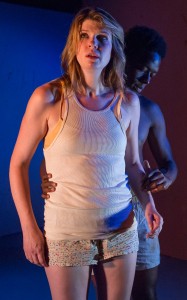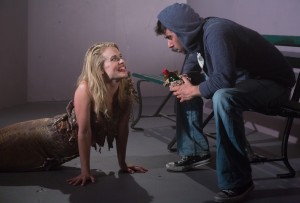It’s difficult to get excited about six straight, homogeneous women sitting around in a weekly support group in Brooklyn eating Chinese, drinking wine, and going on about work, men, and sex in the age of Tinder. Imagine watching The View—add food, wine, and Zumba but without an ethnically diverse panel or politics and you’ve got a gist of #liberated, playing at the IRT Theater in Manhattan. Conceived and written by Lillian Meredith, who is one of the actors, the play is created by an ensemble of artists known as The Living Room, dedicated to creating work about contemporary American women.
#liberated starts out relatively innocuously. The “Sister Support Group for the Daily Trials of Being a Woman,” a.k.a. W-I-P-E (an acronym which is never explained), meets weekly and begins each meeting with a fast and crazy video on learning Zumba moves. This week one of the members has invited another woman to join them without asking the group first. The women seem to be put off by someone new inhabiting their “safe space,” but they soon acquiesce. They pour her a generous mug of wine as if to symbolize acceptance into the tribe. The topic this evening starts out smartly enough about the sexual exploitation of women in advertising, and the conversation devolves into who watches porn and who doesn’t. Over the next few meetings the women decide to bring samples of porn that each likes to share with everyone, and the reactions to one another’s choices are quite funny. Then they get the idea to create a more feminist version of porn, with each creating a scene to be acted out and videotaped. Realizing that this may actually empower and liberate other women, they upload the finished product to the Internet with one swift click.
The video takes off—like after like, share after share—that is, until the Internet trolls, hiding behind avatars and fake names (probably sitting in the dark in their underwear in their parents' basements) come out of the woodwork. The scene is similar to watching celebrities read mean tweets about themselves. The trolls are horrific, one wishing they would “drink bleach and die” and another spewing, “I’m ready to pump GENIUS level sperm into your football-shaped body.” The women lose focus on their original intent and create a new set of sexual videos trolling the trolls. Nothing good comes of it, and the play turns extremely dark.
#liberated is codirected by Rachel Karp and Jaki Bradley—it’s almost as if one directed the first half and the other directed the second. There are some good comedic moments early on, although not sustained, and it’s easy to see that the women enjoy being with one another. Dancing to Enya with multicolored scarves to simulate an undulating vulva is actually a pretty funny moment. However, there is nothing sexy enough nor hardcore enough to warrant the vitriol foisted on them by the Internet trolls. The sexual scenarios mostly come off as silly and tame, which begs the question, why the backlash? These are women who most likely would have experimented in college. They know of PornHub and Max After Dark, but beyond that the script lacks imagination and daring.
As an ensemble piece, #liberated includes Tamara Del Rosso, Zoë Sophia Garcia, Lillian Meredith, Gabby Sherba, Taylor Shurte, and Madison Welterlen. They are good enough, given a marginal script. The Brooklyn apartment set design by Frank Oliva has an Ikea look, which includes nice lighting credited to Scot Gianelli. The sound design by Ben Vigus is across the board and oddly employs misogynistic rap music between the scenes. Vigus evokes Internet sounds, television newscasts, and lively Zumba-type music.
In the world of oversharing on the Internet, between Facebook and every social media app, #liberated seemed to want to say something profound. Unfortunately, it never says enough. It does not include women of color or create a powerful, lasting conversation. In a year where we may see the first female president in this country, it’s way past time for women to step up and truly make a difference in the world for women. At best the only message here is don’t engage in a battle on the Internet—no one ever wins.
#liberated runs until June 19 at IRT Theater (154 Christopher St., 3 Floor, #3 B) in Manhattan. Performances are Wednesday through Monday at 7:30 p.m. Tickets cost $18 and are available at rttheater.org.










